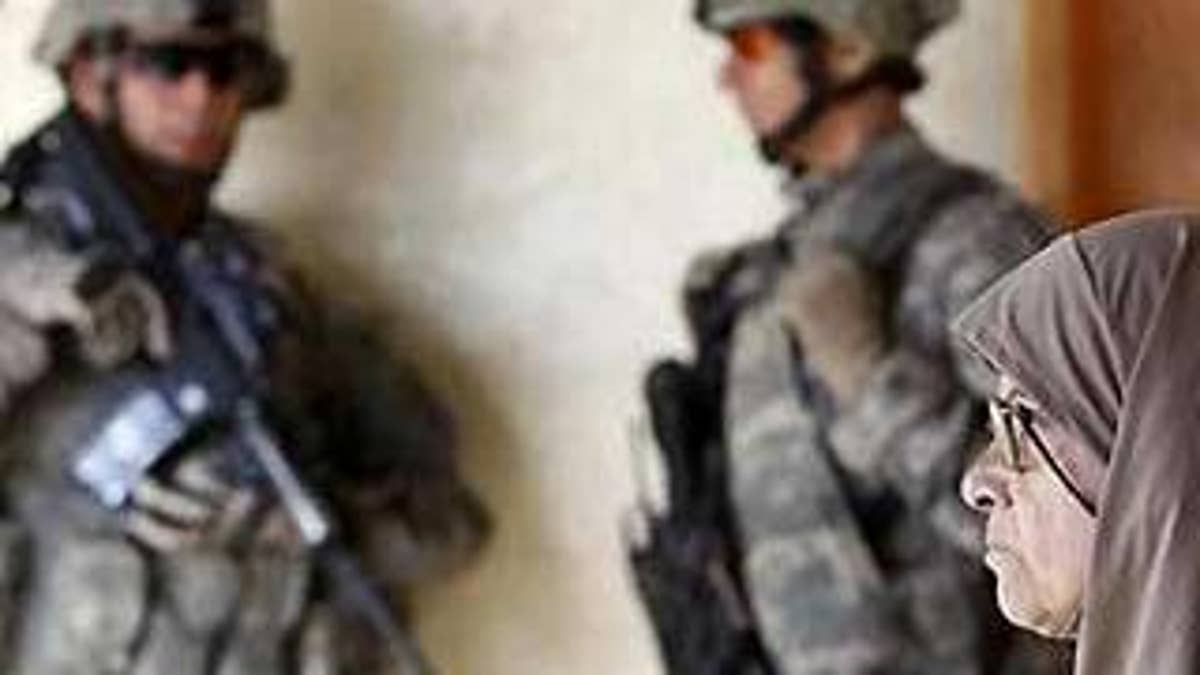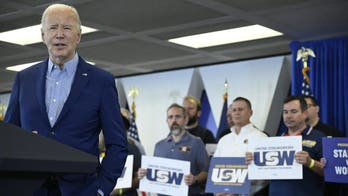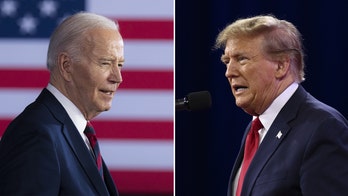
In 18 months, President Obama plans to give America what it hoped it had six years ago -- its "Mission Accomplished" moment in Iraq.
Obama announced Friday his plan to end combat operations in Iraq by the end of August 2010, saying the goal of a "sovereign, stable and self-reliant" Iraq is achievable. Senior officials said the war, effectively, will end before Labor Day next year.
But even supporters of the plan warn that any success in Iraq is fragile. And even if the war is over, the job still is far from done.
President Bush was accused of prematurely declaring victory in May 2003, when he gave a speech aboard the USS Abraham Lincoln in front of a banner that read "Mission Accomplished." As for the headline on Aug. 31, 2010, it may be more like "Mission Accomplished" with an asterisk.
"It's not a mission accomplished day until the Iraqi people are completely able to defend themselves and their international borders without any international assistance," retired Army Lt. Col. Robert Maginnis said.
"There's a temptation to say it's all done, we don't have to worry about what's going on. But we do," he said.
Some analysts warn that U.S. involvement will be necessary for years to come. That obligation is reflected in the administration's withdrawal plan.
Obama would not only retain the flexibility to slow down or reverse the withdrawals if conditions deteriorate, but he also will keep up to 50,000 troops as a residual force in Iraq after the deadline.
The White House says combat brigades will be gone, but "advisory and assistance brigades" will stay. Their mission is to train and advise Iraqi forces, conduct targeted counter-terrorism missions and protect the ongoing civilian and military efforts in the country.
And although Obama said he intends to abide by the Status of Forces Agreement requiring the removal of all U.S. troops by the end of 2011, Defense Secretary Robert Gates said Friday he envisions keeping a small contingent of U.S. troops in Iraq even after the 2011 deadline.
There is a clause in the agreement that allows for a prolonged U.S. presence if the Iraqis request it and if the U.S. agrees.
"My own view would be that we should be prepared to have some very modest-sized presence for training and helping them with their new equipment and providing, perhaps, intelligence support and so on beyond that," Gates said.
Maginnis told FOXNews.com he expects the Iraqis to request an extension of U.S. presence after 2011, since they still need help in training to protect their Syrian and Iranian borders.
"We train professional forces all over the world and it takes decades to do that," he said. "And we're not there yet."
Gen. Ray Odierno, the top commander in Iraq, told FOX News that he thinks the U.S. military will in fact be out by 2011.
"I think the 2 1/2- to 3-year time period we have left is just about the right time period for us, for Iraq to exercise its full sovereignty, and it's time for us to go," Odierno said.
But although some areas of Iraq have begun to stabilize, other areas, like the northern city of Mosul, are still filled with Al Qaeda in Iraq fighters. Commanders say they are worried the oil center of Kirkuk could erupt with sectarian friction. And U.S. troops are still working with an unprofessional and corruption-plagued police force.
Army Maj. Gen. Bob Scales, former head of the Army War College, told FOX News the timeline in place is appropriate. But he said the mission nevertheless will broaden, not disappear, once Iraq is in the rearview.
"Now it's the responsibility of the Iraqi people to get their own country up and running," Scales said. "And our remaining mission is not in Iraq so much, but it's in the region. And that's of course to become engaged in Afghanistan and Pakistan and prevent the spread of radicalism from spreading to the rest of the region."
Sen. John McCain, R-Ariz., told FOX News on Friday he supports the president's plan, but he said it should be clear that a third of the current troop strength will stay "in harm's way" after August 2010. He continues to worry about Iranian influence in the region.
"This is still a fragile, fragile success," McCain said.
A key factor in defining success is defining the mission. And the mission has undoubtedly changed -- from toppling Saddam Hussein to beating back the insurgency that sprouted and kept U.S. forces in the country years longer than expected.
Maginnis said it's reasonable to expect the U.S. can turn over control of all provinces to the Iraqis by Obama's deadline and leave security largely in their hands. But training might have to continue and counter-insurgency efforts will probably linger.
"Insurgencies typically last nine to 12 years and this one is not anywhere close to being over," he said.
Obama said Friday during his address to Marines in North Carolina that he's not aiming for a perfectly stable and peaceful Iraq
"We cannot rid Iraq of every single individual who opposes America or sympathizes with our adversaries," Obama said. "We cannot police Iraq's streets until they are completely safe, nor stay until Iraq's union is perfected."
But he said U.S. troops nevertheless completed the mission that was assigned to them.
"We sent our troops to Iraq to do away with Saddam Hussein's regime -- and you got the job done. We kept our troops in Iraq to help establish a sovereign government -- and you got the job done," Obama said. "And we will leave the Iraqi people with a hard-earned opportunity to live a better life -- that is your achievement. That is the prospect that you have made possible."
FOX News' Greg Palkot and Justin Fishel and FOXNews.com's Judson Berger contributed to this report.




